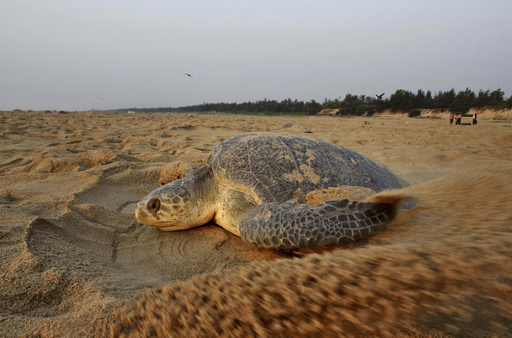“`html
BENGALURU, India — In the past fortnight, over 400 endangered olive ridley sea turtles have been discovered washed ashore along the eastern coastline of India, particularly near Chennai. This alarming occurrence marks an unprecedented event that hasn’t been observed in over twenty years.
These turtles are known to travel thousands of miles each year to find suitable nesting sites along India’s shores. However, they have faced numerous threats over the years due to diminishing nesting beaches globally. Tragic mass fatalities like this can often be attributed to fishing gear that ensnares these turtles, causing significant harm.
Typically, Chennai’s coast sees around 100 to 200 adult turtle deaths annually. However, volunteer Shravan Krishnan from the Students Sea Turtles Conservation Network reported, “This year, we’ve already seen over 200 dead turtles in just more than two weeks.” His concerns extend beyond the fatalities, as he noted a troubling decline in nesting activity. Along with fellow conservationists, they patrol the beaches at night, working to safeguard turtle nests from beachgoers and predators like dogs. “We’ve only discovered four nests so far, which is also quite distressing,” he added.
This rise in turtle fatalities is unprecedented in the last two decades.
For several days now, environmentalists and officials from the forest department have been observing a grim pattern, noting at least ten dead turtles each day, with some days seeing even higher numbers. This surge is the most significant since 2014, when more than 900 olive ridley turtles washed up dead on southern Indian shores. Experts believe that the primary cause of these deaths could be attributed to large fishing nets that drag along the ocean bed.
Wildlife warden Manish Meena stated that efforts are underway to make local fisherfolk aware of the importance of liberating turtles caught in their nets. Additionally, a request has been made to the coastguard to keep a close eye on fishing practices in the region. In 2016, a local government directive was introduced, prohibiting trawl boats from operating within five nautical miles of the coastline during turtle nesting season. This regulation mandates the use of turtle excluder devices, tools designed to enable turtles to escape from nets.
Shantanu Kalambi, a marine veterinary expert at ReefWatch, explained that when trawlers capture turtles, these creatures struggle to surface for air. Unfortunately, the use of escape devices is often neglected by fishermen, as these tools can potentially decrease their catch of fish.
The olive ridley turtle species is classified as vulnerable, facing various threats including habitat loss, marine pollution, and the risk of entrapment in fishing gear.
The hatching period for turtle eggs lasts about two months, making them susceptible to threats from increased human activity on beaches, rising temperatures, and light pollution, which can confuse hatchlings as they navigate toward the sea.
In Odisha state, further up India’s east coast, over 500,000 turtles nest annually in a collective nesting event known as Arribada. Despite this mass nesting, only about one in every 1,000 hatchlings survives to reach adulthood.
Turtles play a crucial role in sustaining a balanced marine ecosystem, as jellyfish constitute a significant part of their diet. An unchecked jellyfish population could negatively impact marine biodiversity. “As a species, they boast millions of years of history and are vital to the food web,” noted Kalambi.
“`



